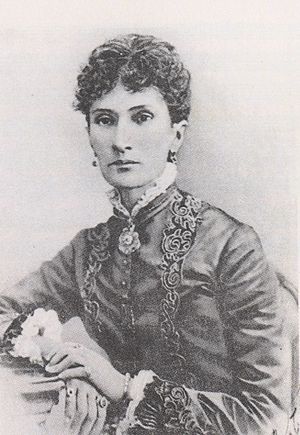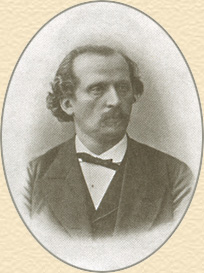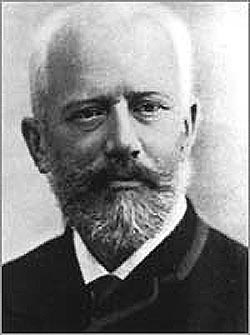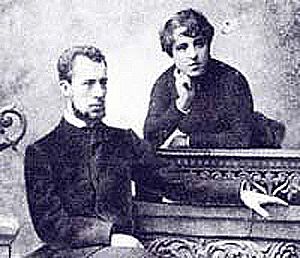Nadezhda von Meck facts for kids
Quick facts for kids
Nadezhda Filaretovna von Meck
|
|
|---|---|

Nadezhda von Meck
|
|
| Born | 10 February [O.S. 29 January] 1831 Znamenskoye, Smolensk Governorate, Russian Empire |
| Died | 13 January 1894 (aged 62) Nice, France |
| Husband | Karl Otto Georg von Meck |
| Issue | 13 children |
| Father | Filaret Frolovsky |
| Mother | Anastasia Dimitryevna Potemkina |
Nadezhda Filaretovna von Meck (Russian: Надежда Филаретовна фон Мекк; February 10, 1831 – January 13, 1894) was a powerful Russian businesswoman. She became a very important supporter of the arts, especially music. She is best known today for her special friendship with the famous composer Pyotr Ilyich Tchaikovsky. She gave him money for thirteen years. This allowed him to focus only on writing music. They had one rule: they were never to meet in person. Tchaikovsky dedicated his Symphony No. 4 in F minor to her. She also helped other musicians, like Nikolai Rubinstein and Claude Debussy.
Contents
Life of Nadezhda von Meck
Early Life and Family
Nadezhda von Meck was born Nadezhda Filaretovna Frolovskaya. Her family owned large areas of land. Her father, Filaret Frolovsky, loved music very much. From her mother, Anastasia Dimitryevna Potemkina, she learned to be strong and good at business.
When she was young, Nadezhda studied music seriously. She became a skilled pianist. She knew a lot about classical music. She also learned several foreign languages. She enjoyed art and read many books. These books were about literature, history, and philosophy.
Marriage and Business Success
At age seventeen, Nadezhda married Karl Otto Georg von Meck. He was a 27-year-old engineer. They were from Baltic German families in Riga. Together, they had thirteen children. Eleven of them lived to be adults.
Karl von Meck worked for the government. His job was not exciting and didn't pay much. With many children to support, he was afraid to leave his steady job.
Nadezhda von Meck saw things differently. She thought being a mother, nurse, and housekeeper was easier. It was better than seeing her husband stuck in a boring government job. She kept pushing him to make a change. Russia needed more railways. Nadezhda knew this was a big chance for her husband. She kept telling him to find a business partner. She wanted him to join the fast-growing railway building industry in Russia.
Karl finally listened to his wife. He quit his government job. At first, they had very little money to live on. But Nadezhda was right to trust Karl's engineering skills. In 1860, Russia had only 100 miles of railway track. Twenty years later, there were over 15,000 miles! Karl von Meck was a big part of this growth. His investments made him a multi-millionaire. He built important railway lines. These included the line from Kursk to Kiev. He also built the very profitable Moscow to Ryazan line. This line controlled grain transport from the rich farming areas.
In 1876, Karl von Meck died suddenly. His will gave Nadezhda control of his huge fortune. This included two railway networks. She also owned large estates and millions of rubles in investments. Seven of their eleven children were still at home. Nadezhda von Meck focused on her business and her children's education. She sold one of Karl's railway companies. She managed the other one with her brother and her oldest son, Vladimir.
Life After Her Husband's Death
After her husband died, Nadezhda von Meck stopped going out in society. She lived a very private life. She even refused to meet the families of her children's future spouses. She never went to any of their weddings.
Nadezhda von Meck was a very strong-willed person. She ruled her home like a queen. She always expected to get her way. She surrounded herself only with people who would agree with her. She controlled every part of her children's lives. As they grew up, she arranged their marriages. She bought houses for them. She even picked out the furniture for their homes. When she wanted to see her married children, she would tell them to come. She did not invite them. Her children were not always happy with how much their mother controlled them.
Nadezhda von Meck was always busy. She would take her older servants on tours of her house. They would go from the basement to the roof. The house always changed after these tours. She saved string to untangle and wind up. She bought books just to cut the pages. She bought lots of wool. She would wind it into balls. Then she sent it to her daughter, Countess Bennigsen. While doing these things, she would ask her daughter Julia to read to her. Julia didn't mind. Of all the Meck children, Julia was the most eager to please her mother. Her mother asked for everything from her, and Julia gave it.
Meck probably knew that she could be difficult to be around.
Her Personal Beliefs
Nadezhda von Meck said she was an atheist. This was not unusual for rich people in Russia in the 1870s. But her strong need for independence was very unusual for a woman at that time. She wanted to be free, but she also cared deeply for her family. This led to some differences between what she believed and what she did. She had strict moral views on love. But she did not believe in marriage as a social rule. She often told Tchaikovsky that she hated marriage.
She wrote to Tchaikovsky, "You might think, my dear Pyotr Ilyich, that I love marriage. But so you are not mistaken about me, I will tell you that I am, instead, a strong enemy of marriages." She also said, "I find the way rights and duties are set by social laws to be wrong and immoral."
Even with her views on marriage, Nadezhda von Meck accepted it. She saw it as a way to keep society stable and to have children. Her own marriage may have shown her its good points. This might be why she tried to marry off her children quickly. She wanted to make sure they were stable if something happened to her.
Supporting the Arts
Nadezhda von Meck had a lot of money and loved music. She became a very important person in Russian performing arts. The only time she left her private life was to go to the Russian Musical Society concerts in Moscow. She would go secretly and sit alone in the balcony. At these concerts, she met Nikolai Rubinstein. She had a complicated relationship with him. She respected his talent and energy. But she also strongly disagreed with him sometimes.
While her husband was still alive, Nadezhda von Meck started helping young musicians. She hired several of them to live in her home. They would play her favorite music. She hired Claude Debussy to teach music to her daughters. He wanted to marry one of them. But she would not allow it. She preferred her daughters to marry men she chose. They did, but all their marriages ended in divorce.
In February 1880, Meck helped the Polish violinist Henryk Wieniawski. He became sick in Odessa during a concert tour. She moved him into her house and arranged for doctors to treat him. But he died a few weeks later in Moscow.
Friendship with Tchaikovsky
In 1877, one of the musicians she supported was the violinist Iosif Kotek. She played chamber music with him. Kotek was a former student and friend of Pyotr Ilyich Tchaikovsky. Nikolai Rubinstein had recommended Kotek to Meck. She was already impressed with Tchaikovsky's music. She liked his symphonic poem The Tempest. She asked Rubinstein many questions about him. Then she wrote to the composer. She introduced herself as a "fervent admirer." She asked him to write some pieces for violin and piano to be played at her house. Tchaikovsky quickly agreed. One of her first requests was for a funeral march. This piece was never published and is now lost.
They kept writing to each other. Their friendship grew. She then gave him an allowance of 6,000 rubles a year. This was a lot of money. It was enough for him to leave his teaching job at the Moscow Conservatory. He could then focus on composing music full-time. To give you an idea, a minor government official at that time supported his family on 300–400 rubles a year.
Tchaikovsky was thankful for von Meck's financial help. But it also made him feel a bit uncomfortable. They both handled this feeling very carefully. Still, Tchaikovsky felt a little uneasy about the many favors Meck gave him. He wrote to her honestly about this. He said, "... in my relations with you there is the tricky situation that every time we write to one another, money appears."
Letters and Support
They wrote many letters to each other. They exchanged over 1,200 letters between 1877 and 1890. The things they shared were amazing for two people who never met. He was more open with her about his life and how he created music than with anyone else. Her feedback became very important to him. When critics strongly disliked his Fifth Symphony, she gave him the support to keep composing. Meck died thinking these letters had all been destroyed. But when Tchaikovsky got her request to destroy them, he told her he had. Then he filed that letter with all the others for people to find later.
Nadezhda von Meck remained a loyal supporter of Tchaikovsky and all his works. But their bond depended on them not meeting. This was not just because he might not live up to her expectations. She wanted to think of Tchaikovsky as her perfect composer-philosopher. Tchaikovsky understood this. He wrote to Meck, "You are quite right, Nadezhda Filaretovna, to think that I am like you in my unusual spiritual feelings, which I understand completely."
They did meet once by accident. This happened in August 1879. Tchaikovsky was staying at the Meck estate at Simaki. He went for his daily walk in the forest earlier than usual. He didn't know that she was late for her daily drive through the same area with her family. So, they came face to face for a few moments. He politely tipped his hat. She was surprised, but no words were spoken. He wrote to her that evening to say sorry for breaking their agreement by accident. She replied that there was nothing to apologize for. She even invited him to visit her home to see her new paintings. But she said to come when she would be away.
The year before, Tchaikovsky was staying at her villa in Florence. He had seen her and her group pass by every morning. They also saw each other once at the opera, but only from a distance.
Dedication of Symphony No. 4
Tchaikovsky dedicated his Symphony No. 4 to her. This was a way to show his thanks. In Russian society, a patron (supporter) and an artist were seen as equals. Dedicating works to patrons showed they were artistic partners. By dedicating the Fourth Symphony to Nadezhda von Meck, he showed she was an equal partner in its creation.
A Family Connection
In 1883, Nadezhda von Meck's son Nikolai married Tchaikovsky's niece Anna Davydova. This happened after five years of efforts by both Meck and Tchaikovsky to arrange the marriage. Meck was in Cannes at the time. She did not go to the wedding. She kept her rule of avoiding all contact with the families of her children's spouses. However, Tchaikovsky did attend. He met the rest of the Meck family.
At first, both Meck and Tchaikovsky were happy about this marriage. They saw it as a symbolic joining of their own friendship. But later events made them question their choices. Anna was very strong-willed herself. She controlled her husband. She also disagreed with her mother-in-law on family matters. This was especially true in a fight between Nadezhda's oldest son, Vladimir, and the rest of the family. Instead of bringing Nadezhda von Meck and Tchaikovsky closer, Anna and Nikolai's marriage may have pushed them apart. Tchaikovsky almost disowned his niece to avoid a big fight. Meck hid her true feelings about what was happening from him.
The End of Their Friendship
In October 1890, von Meck sent Tchaikovsky a year's allowance in advance. With it, she sent a letter ending her support. She said she was bankrupt. The break was very sudden. Just a week before, she had sent him a very personal and loving letter. That letter talked a lot about how her children were wasting their future money.
This was a constant worry for Meck. But it wasn't necessarily why she ended her support for Tchaikovsky. However, giving him a year's allowance at once could mean she feared not having money to send later. She usually sent it in monthly payments. Others don't agree with this idea. Most importantly, Meck asked Tchaikovsky in her last letter not to forget her.
Two things likely led to Nadezhda von Meck's decision to end the friendship:
- By 1890, she was very sick. She was in the late stages of tuberculosis. She would die two months after Tchaikovsky's death. One of her arms was weak, making writing almost impossible. It would have been awkward to have someone else write such personal letters for her.
- Her family strongly pressured her to end the relationship. Her children were embarrassed by her close friendship with Tchaikovsky. People in society gossiped about the composer and "La Meck." To her relatives, the situation seemed scandalous. Even worse, they thought he kept taking Meck's money freely. This was true even after he received a generous pension from Tsar Alexander III. As the children's own money problems grew, they wanted to end the arrangement between their mother and Tchaikovsky. By mid- to late 1890, almost all her older children had visited her. They may have given her a final demand. Meck's trusted servant, Ivan Vasilyev, delivered the final letter and payment to Tchaikovsky. Tchaikovsky liked Ivan. She had never sent anything to him this way before. She had always sent letters and checks by mail.
Von Meck also knew that Tchaikovsky often needed cash. This was true even with the large sums she gave him. Tchaikovsky was not good at managing money. He would ask her for the next year's allowance several months early. Knowing this habit, she might have expected him to need the money.
Possible Reconciliation
Galina von Meck was the daughter of Nadezhda von Meck's son Nikolay and Tchaikovsky's niece Anna. She said that the break was secretly healed. In September 1893, just weeks before Tchaikovsky's death, Anna was going to Nice. Nadezhda von Meck was dying there, and Anna was going to nurse her. Tchaikovsky asked Anna to beg his former friend for forgiveness for his own silence. This apology was reportedly accepted by Meck and returned. The Tchaikovsky writer Dr. David Brown says that Galina's story "contains much gossip and a good deal that is made more romantic." But he agrees that her story might be true. This is especially because Galina heard the story directly from her mother.
Financial Challenges
Nadezhda von Meck's claim of bankruptcy was partly true. Karl von Meck had left a large amount of debt when he died. This debt was much bigger than his wife had known before. Rumors about this debt started in the early 1880s. Tchaikovsky had asked her about it in his letters.
The debt problem got worse because her son Vladimir managed Nadezhda von Meck's business affairs poorly. Vladimir was good at public relations, like his father was at engineering. But Vladimir spent money as much as his mother did. He was her favorite child. This might be why his mother put up with his ways for so long. Sadly, this also caused fights between her and Vladimir, and his siblings and sister-in-law, Anna (Tchaikovsky's niece). They claimed, among other things, that he was taking company money for himself. Whatever the truth, the Meck family's money was in serious danger.
In 1890, Vladimir von Meck had a nervous breakdown. That summer, his mother removed him from his position. His replacement was his mother's personal assistant, Władysław Pachulski. Pachulski was first hired as a musician. He became part of the family by marrying Julia von Meck. He was also much better at managing money than Vladimir had been. He was able to save the Meck estates from going bankrupt. Meanwhile, Vladimir was found to have an advanced case of tuberculosis. This was the same disease his mother had. He died from it in 1892.
Death
Nadezhda von Meck died from tuberculosis on January 13, 1894. She passed away in Nice, in the south of France. This was two months after Tchaikovsky's death.
After her mother-in-law's death, Anna von Meck was asked how the late patroness handled Tchaikovsky's death. She replied, "She did not endure it."
Donation by Galina Nikolayevna von Meck
In 1985, Galina von Meck gave a collection to Columbia University. This collection included her translation of 681 letters. These letters were written by Tchaikovsky to his family. The letters covered the time from March 1861 to September 1893.
See also
 In Spanish: Nadezhda von Meck para niños
In Spanish: Nadezhda von Meck para niños




